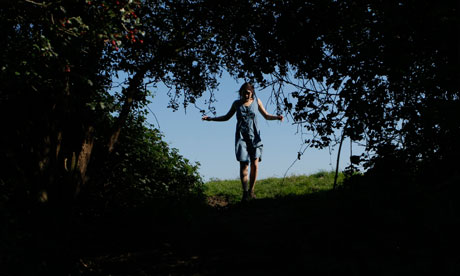
The disturbing, violent, neo-Bressonian work of the French film-maker Bruno Dumont has waxed and waned in potency over the years: his Life of Jesus (1997) and the bizarrely compelling Humanity (1999) established his vision. There is a social-realist aesthetic, and a stark, islanded beauty and bleakness in the areas of northern France where Dumont prefers to film; there is an enigmatic mysticism amid explicit brutality, and a distinctive use of non-professional actors encouraged to maintain an unsmiling blankness and transcendental ordinariness. (To the astonishment of some, Emmanuel Schotté won the best actor prize at Cannes for a deadpan, untutored, almost childlike performance as the troubled police officer in Humanity, his single screen credit to this day. He was certainly an eerily powerful presence.)
Dumont has begun to repeat himself lately, but Hadewijch, made three years ago and only just finding its way to UK cinemas, is his most successful recent work. It is genuinely mysterious and unsettling, with a batsqueak of dreamlike strangeness in the realist setting. Julie Sokolowski is classic non-pro Dumont casting as Céline, the twentysomething daughter of a wealthy politician, resident in a remote nunnery as a novitiate, alarming the elders with her fierce belief: fasting, praying and cultivating a passionate obsession with God's absence from human life. She identifies with the 13th-century mystic Hadewijch. Suspected of sinful pride, Céline is asked to leave, so she returns to Paris and her well-to-do parents. She strikes up an acquaintance with young Muslim men from the inner-city banlieues and finds that their jihadism strikes a chord. So Céline's spiritual journey takes her, inevitably, to violence, although the climactic moment, and her precise role in it, are represented indirectly. Meanwhile, a semi-reformed crook employed to do casual work at the nunnery has a disquieting recurrent cameo – he is played by David Dewaele, upgraded to lead status for Dumont's most recent film, Outside Satan.
Familiar Dumont tropes and images are present: as in many of his films, an itinerant criminal is led away into a police van, and then to jail, from which we may be sure he will re-emerge. Dumont has a way of giving the lineaments of this ordinary waking world a jolt or a nudge: creating a what's-wrong-with-this-picture? effect. At one stage, Céline is seen in the back of a car somewhere in the war-torn Middle East with her friend Nassir, played by Karl Sarafidis. (How has she squared it with her parents? Did she pay for both their return flights? Who knows?) It looks, for a deeply weird moment, as if she is still in France, and the bombs and explosions are happening there, or in some spiritual domain in her mind. Has she finally journeyed closer to God or, irrevocably, away? It is up to us to decide. Dumont has an unique ability to create enigmatic, contemporary parables that get under your skin.

